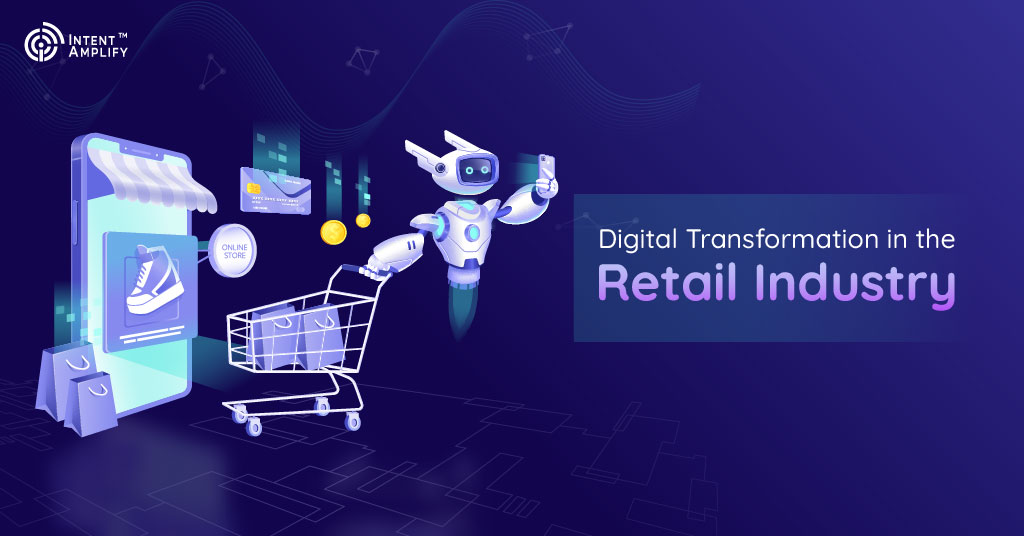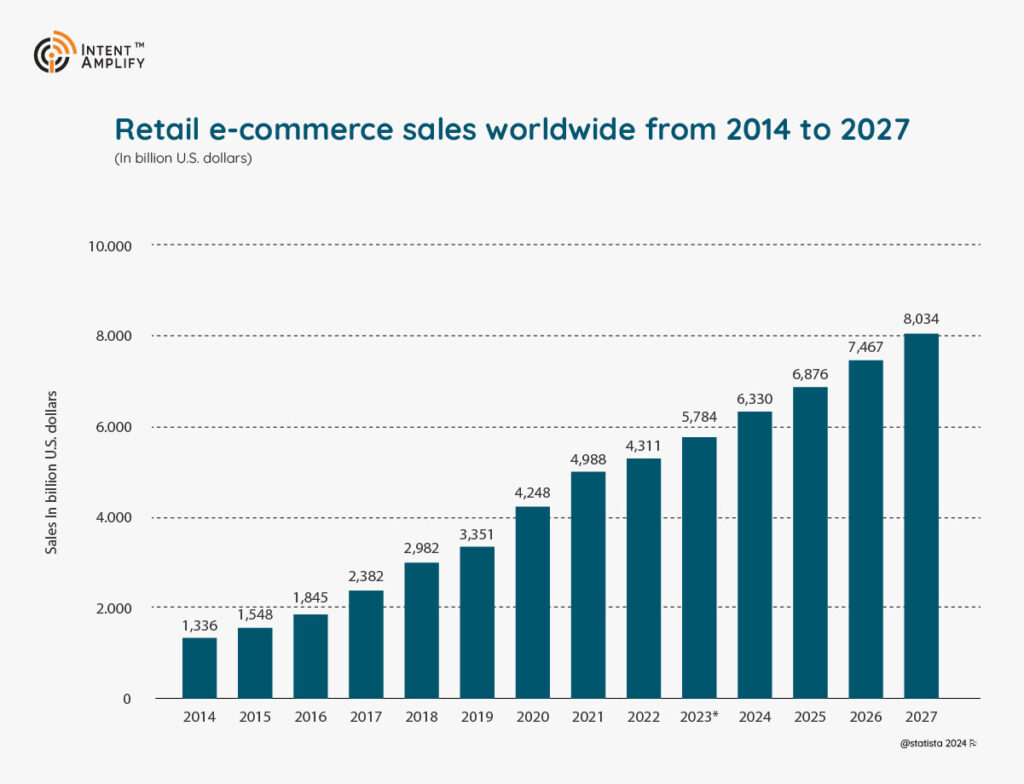
Embracing the Rewards of Digitization in Retail
The retail industry has been undergoing a significant transformation driven by the rapid advancement of digital technologies. This digital shift has not only reshaped consumer behavior but also revolutionized the way retailers operate, market, and interact with their customers. In this blog, we will explore the various aspects of digital transformation in the retail industry, the rewards it brings, and how Intent Amplify can help companies navigate this complex landscape with their expertise in B2B digital marketing.

What are the Changing Factors Driving Digital Transformation In the Retail Industry?
Digital transformation in the retail industry is propelled by several key factors:
1. Changing Consumer Behavior: Modern consumers are more connected, informed, and demanding than ever before. You can estimate this from the fact that In 2023, the number of annual online shoppers was estimated to be about 250 million across a tremendously growing market like India. Customers having become accustomed to the quickness of the online world, expect the same seamless, personalized shopping experiences across multiple online channels and also in the brick-and-mortar store.
2. Technological Advancements: The proliferation of new technologies such as artificial intelligence (AI), machine learning, big data analytics, and the Internet of Things (IoT) has opened up new opportunities for retailers to optimize operations, enhance customer experience, and drive sales. Consumers are expecting ease of transaction and a speed that matches the AI-driven world.
3. Competitive Pressure: With the rise of e-commerce giants like Amazon, traditional retailers are under immense pressure to innovate and stay competitive. Adopting digital technologies is no longer optional but a necessity for survival and growth. It helps to realize that these e-commerce platforms are only creating more sales avenue and their true potential can be achieved only when retailers make use of them.
4. Operational Efficiency: Digital tools and technologies help streamline various aspects of retail operations, from supply chain management and inventory control to marketing and customer service, leading to increased efficiency and reduced costs.
Key Components of Digital Transformation in Retail
1. E-Commerce and Omnichannel Strategies: The rise of e-commerce has been a game-changer for the retail industry. Retailers are now adopting omnichannel strategies to provide a cohesive shopping experience across online and offline channels. This includes integrating online stores with physical locations, offering click-and-collect services, and ensuring consistent branding and messaging across all touchpoints.
2. Personalization and Customer Experience: Personalization is at the heart of digital transformation in retail. By leveraging data analytics and AI, retailers can gain insights into customer preferences and behaviors, allowing them to deliver personalized recommendations, offers, and experiences. Enhancing customer experience through personalized interactions helps build brand loyalty and drives repeat business.
3. Supply Chain and Inventory Management: Efficient supply chain and inventory management are critical for meeting customer demands and reducing costs. Digital tools such as IoT sensors, RFID tags, and advanced analytics enable real-time tracking of inventory, demand forecasting, and automated reordering, ensuring optimal stock levels and minimizing wastage.
4. Marketing and Customer Engagement: Digital marketing has become an essential component of retail strategy. Social media, email marketing, search engine optimization (SEO), and content marketing are some of the key tactics used to engage customers, drive traffic, and boost sales. Retailers are also using AI and machine learning to create targeted marketing campaigns that resonate with their audience.
5. In-Store Technology: In-store technology such as self-checkout kiosks, digital signage, and mobile payment options enhance the shopping experience by making it more convenient and efficient. Augmented reality (AR) and virtual reality (VR) are also being used to create immersive shopping experiences, allowing customers to try products virtually before making a purchase.
Digital Transformation is Greatly Uplifting the Retail Industry
1. Enhanced Customer Experience: Digital transformation enables retailers to provide a seamless and personalized shopping experience, improving customer satisfaction and loyalty.
2. Increased Sales and Revenue: By leveraging digital marketing, personalization, and omnichannel strategies, retailers can attract more customers, increase conversion rates, and boost sales.
3. Improved Operational Efficiency: Digital tools streamline various aspects of retail operations, reducing costs and improving efficiency.
4. Better Data-Driven Decision-Making: Access to real-time data and advanced analytics allows retailers to make informed decisions, optimize strategies, and respond quickly to market changes.
5. Competitive Advantage: Embracing digital transformation helps retailers stay ahead of the competition by adopting innovative technologies and meeting evolving customer expectations.
But Of Course, Not Without a Few Challenges
Nothing great has ever been achieved easily. But the rewards of embracing digitization in retail are worth the challenges. Let’s look at each of them in slight detail.
1. High Implementation Costs: Adopting digital technologies can be expensive, requiring significant investment in infrastructure, software, and training.
2. Data Security and Privacy: Handling large volumes of customer data comes with the responsibility of ensuring its security and privacy. Retailers must comply with regulations and implement robust security measures.
3. Integration with Legacy Systems: Integrating new digital tools with existing legacy systems can be challenging and may require significant effort and resources.
4. Change Management: Digital transformation involves significant changes in processes and culture. Retailers must manage these changes effectively to ensure a smooth transition.
What are Some Trends in Digital That Retailers Can Expect
1. Artificial Intelligence and Machine Learning: AI and machine learning will continue to play a crucial role in retail, from personalization and customer service to inventory management and fraud detection.
2. Augmented Reality and Virtual Reality: AR and VR will become more prevalent, providing immersive shopping experiences and helping customers make more informed purchasing decisions.
3. Blockchain Technology: Blockchain can enhance transparency and security in supply chain management, ensuring the authenticity and traceability of products.
4. Voice Commerce: Voice-activated assistants like Amazon’s Alexa and Google Assistant are transforming the way customers shop, making voice commerce a growing trend in retail.
5. Sustainable Practices: Digital transformation will also focus on sustainability, with retailers adopting eco-friendly practices and leveraging technology to reduce their environmental impact.
How Intent Amplify Can Help (TL;DR: We do Digital Marketing)
As a retailer, you are expected to know only some of what it takes to succeed in the increasingly digital world. You’d rather focus on your business than explore this vast niche on how to operate your business in the modern world. For that, there are digital marketing experts, like Intent Amplify. With our expertise in B2B digital marketing, we can play a pivotal role in helping companies navigate the complex landscape of digital transformation in the retail industry.
Here’s how:
1. Advanced Analytics and Data-Driven Strategies: Our team utilizes advanced analytics to gain deep insights into customer behavior, market trends, and campaign performance. This data-driven approach enables retailers to make informed decisions and optimize their marketing strategies for better results.
2. Personalized Marketing Campaigns: By leveraging AI and machine learning (and of course, our skilled human creators with their creative brains), We can create highly personalized marketing campaigns that resonate with the target audience. Personalized campaigns lead to higher engagement, conversion rates, and customer loyalty.
3. Increasing Organic Reach: Our company specializes in developing and executing omnichannel organic marketing strategies that provide a unified shopping experience across online and offline channels. This will help retailers to promote their brands digitally and reach their targets organically.
Let’s Go Digital!
To conclude, digital transformation is revolutionizing the retail industry, offering numerous benefits but also posing significant challenges. By embracing digital technologies and strategies, retailers can enhance customer experience, improve operational efficiency, and stay competitive in a rapidly evolving market. Intent Amplify, with its digital marketing expertise, is well-positioned to help companies navigate this transformation and achieve their business goals.




